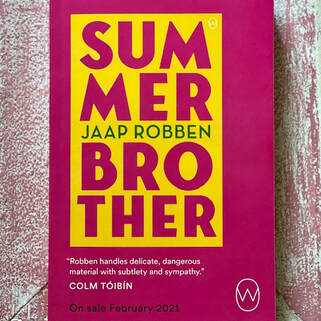|
by Rana Asfour “Summer Brother” by Japp Robben, trans. from the Dutch by David Doherty. World Editions (288p) - released February 9, 2021 Jaap Robben’s second novel, translated from the Dutch by David Doherty, is the tender tale of the bond between brothers. Set to release February 2021 by World Editions, “Summer Brother” is the tale of thirteen-year-old Brian, who since his parents’ divorce, lives with his odds job, detached dad, Maurice, in a run-down trailer that they rent from two shady brothers Jean and Brown Henri. A new tenant, Emile, has just moved in to the trailer close to Brian’s. Lucien, Brian’s brother, lives in a group home due to congenital mental and physical disability. His unresponsiveness to his brother’s interactions with him represents Brian with conflicting thoughts on whether his brother actually exists beyond the days when he sees him. I don’t think I missed Lucien. He just wasn’t there. It wasn’t like he’d disappeared, more like someone had switched him off. Put him to sleep. Like he dozed off after every visit and dreamt of us all week long. And on Sundays, right before we pulled into the car park, a nurse would wake him up." -- "Summer Brother" by Jaap Robben On an unscheduled visit with Lucien everything takes a turn: Brian’s mum has left on honeymoon without so much as a word to Brian or his dad, Lucien’s facility is being renovated for the summer and management are struggling to find temporary accommodation for him and Brian is smitten by Selma, the nineteen-year-old resident at Lucien’s group home who dances the ‘Belly-Belly’ with him. After much deliberation, and the promise of a monetary reimbursement, Brian’s dad finally agrees to take on Lucien’s month-long care despite his landlords’ re-instated warnings that the place is not fit for any child. As soon as they’re home, Maurice decides to deal with the added burden of Lucien’s presence in the way he deals with all his troubles; by ignoring them completely. And so, to this effect, the task of Lucien’s daily needs is relegated to Brian who is left alone to deal with Brian’s hygiene, nourishment and dispensation of his medication. But, how, questions Brian, is he supposed to know what his brother needs when they can’t communicate? Resourceful and observant, Brian is also instinctively altruistic and constantly laboring to do the right thing. Regarding the task as a chance for him to share precious time with a brother he misses, he puts his heart into his task all the while questioning his father’s ineptitude as a parent, resenting his place in the world as his father’s son and figuring out how he’s going to keep his promise to Selma to visit with her. Can you manage without help?” Quickly, things deteriorate not only for Maurice when his landlords threaten to evict him if he does not pay his accumulating rent, but also with Brian, who, as reliable as ever, nonetheless struggles to juggle his duties between keeping a constant eye on his brother and his guilty feelings when he leaves him alone to visit with Selma, never mind the disastrous consequences that incure. His only possible solace in all this is Emile, who he seems to develop an attachment to but Maurice’s instant dislike of Emile only adds embers to a raging novel headed towards what threatens to be a complete and utter scorcher. “Summer Brother” is on some level a very sad, at times distressing novel not only with regards the harsh world that some teenagers exist in, especially when surrounded by damaged role models specifically and disengaged adults generally, but also on how disability impacts the family system as well as society’s response when it comes face to face with it. The disability can consume a disproportionate share of a family's resources of time, energy, and money, so that other individual and family needs go unmet coupled with the guilt when assistance is required, all contributing to marital homes buckling under the pressure as in the case of Brian’s family. That said, though, the novel is an equally warm, humorous, and deeply affective one in which all the characters feel believable. The writer, and in turn the translator, opts for sparse language and candid humor to handle a novel with sensitive themes centered on disability, sex and even poop-filled diapers, with a respect and a nuance that steers clear of melodrama and stereotype. Readers cannot help but root for Brian and Lucien’s summer and what might prove to be a once in a lifetime chance at creating a shared memory. Despite the shocking end, readers, and this one in particular, are left reminded of the undeniable truth that for love -- a complicated concept in and of itself that people demonstrate differently -- to subsist, the ingredients don’t have to be perfect. “Summer Brother” makes for a perfect Book Club Choice (check out a list of questions by the publisher HERE) Jaap Robben is a poet, playwright, performer, and acclaimed children's author. "You Have Me to Love", his first novel for adults won the 2014 Dutch Booksellers Award, the Dioraphte Prize, and the ANV Award for best Dutch debut. Robben was chosen as one of the featured debut authors at the 2018 Brooklyn Book Festival. "Summer Brother" is a bestseller in the Netherlands and is his second novel. David Doherty studied English and literary linguistics in the UK before moving to the Netherlands, where he has been translating all manner of Dutch texts since 1996. He was commended by the jury of the 2017 Vondel Translation Prize for Marente de Moor's (The Dutch Maiden) and Jaap Robben's "You Have Me to Love" and was runner-up in 2019 for his translation of "Monte Carlo" by Peter Terrin.
0 Comments
Your comment will be posted after it is approved.
Leave a Reply. |
Archives
March 2021
|





 RSS Feed
RSS Feed
